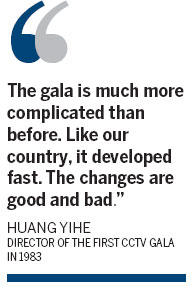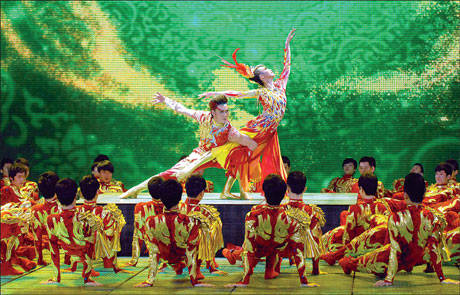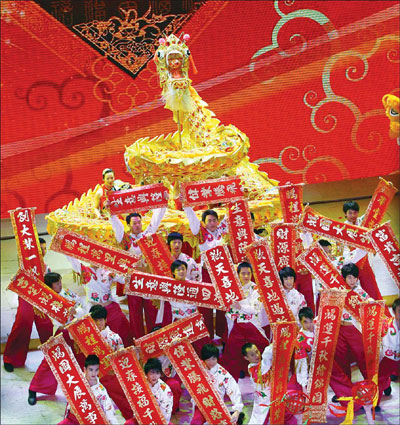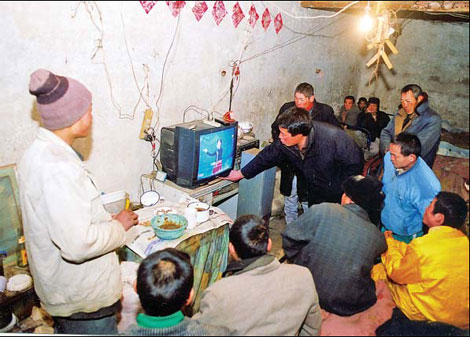A gala performance brings in the new year
Updated: 2012-01-28 07:19
By Chen Nan (China Daily)
|
|||||||||||
|
Two dancers dressed up as a dragon (left) and a phoenix perform a dance Long Feng Cheng Xiang (prosperity brought by the dragon and the phoenix) during the China Central Television's Spring Festival gala on Jan 22. Xinhua |
|
The opening performance of the 2004 Spring Festival gala. Dong Fang / For China Daily |
|
Migrant workers watch the Spring Festival gala in a shelter in Jiangsu province in 2009. Ri Yue / For China Daily |
Show is more than just entertainment and is now a cultural ritual for millions of families across the land, Chen Nan reports.
For hundreds of millions of families, watching China Central Television's (CCTV) Spring Festival gala, or Chun Wan, has long been a Lunar New Year ritual, along with eating dumplings and setting off fireworks. Broadcast live on Chinese New Year's Eve, the nearly five-hour event features a variety of acts, including dance, music, comedy and magic. It has notched up several world records, such as the largest audience for an annual variety show, most performing artists and longest. The show reportedly draws between 400 million to 700 million viewers. If a comparison had to be made, a distant rival might be the Super Bowl, which usually takes place around the same time of year. Often billed as the most-watched US television broadcast, the Super Bowl draws an average audience of more than 100 million viewers.
But the CCTV gala is not merely entertainment.
"It's part of modern culture for Chinese people," Huang Yihe, director of the first CCTV gala in 1983, said. "The audience gathers in front of the TV and watches the gala with families and friends. They have been working for a whole year and need an outlet to express their emotions, be they happy or sad."
The first CCTV gala was broadcast live, which was a new concept for audiences then. In those days it was considered a luxury to have a TV.
"Everyone wore the same clothes, rode bicycles and made a similar amount of money. The gala, with its colorful stage and beautiful stars, was like a new world for them," Huang said.
As more and more families bought TV sets, the gala became an indispensable part of New Year's Eve, just like traditional food.
"Unlike any other galas in China, the CCTV gala is a comprehensive project. The organizers have to do research on viewers' psychological needs, control each program's tempo and balance the show's variety," 77-year-old Huang said. "The planners have to know the audience and understand what they like."
Huang cited the example of Li Guyi, one of the first really big pop stars. One of Li's hits, Attachment to My Homeland, was, at first, not considered by the organizers, but was demanded by the audience and performed by Li during the gala. It went down a treat with the public.
"Li sang seven songs in the 1983 gala, a record," Huang said.
The 1983 gala used movie stars and comedians as hosts.

"I wrote my lines before the show and practiced in front of the mirror at home," said actress Liu Xiaoqing. She also sang two songs.
"We didn't have stylists and we wore our own clothes. I remember that I wore a bright red shirt that I bought in Hong Kong. After the gala, I saw many women wear similar clothes. That's the power of the gala, it can set a trend," she said.
The first gala was voted as the all-time favorite among audiences in 2007 by a massive 400,000 votes.
For Huang, who has directed the gala four times, it was actually the 1984 version that impressed him the most.
"For the first time the gala had a Hong Kong singer, Cheung Ming-men. The song My Chinese Heart made me cry. I know that might be difficult for people to understand today. But for me it was really a milestone to have him on stage. The cultures of Hong Kong and the mainland were so different and far away then. But Cheung made us feel connected," he said.
In 1985 the gala moved into the Beijing Workers' Gymnasium for the first time. But the technology was not as advanced as today and the crew took six hours to finish the recording.
The gala also gave birth to stars. Eating Noodles, the first skit in China by Chen Peisi and Zhu Shimao, was one of the most popular programs in 1984 thanks to its witty plots. Chen played the role of Chen Xiaoer, a jobless man who went for a movie audition. Zhu played the role of the movie director.
"We had no idea about what xiao pin (skit) is then. We just made it simple and funny," said Chen, who is considered one of the most successful comedians in China. "From the script to the clothes we wore on the stage, we took care of everything. We were so worried because we had no experience at all. The program received widespread praise, beyond our wildest dreams."
But times are changing.
"The gala is much more complicated than before. Like our country, it developed fast," Huang said. "The changes are good and bad."
The gala's popularity has been in decline in recent years. Going through media reports and blogging comments on the 2011 show marking the Year of the Rabbit, one could easily see that the number of comments slamming the event were far greater than before.
According to CCTV's own market research of 2,098 families, some 93.88 percent nationwide watched the 2011 gala, and 81.92 percent of them gave the show high marks. But according to the Beijing Evening News, one online survey of 10,000 respondents showed as much as 59 percent said they were disappointed with the show and only 6 percent expressed satisfaction.
Moreover, several TV stations, including those in Hunan and Jiangsu provinces as well as Shanghai, launched their own variety shows in 2012 to compete with CCTV for audience and advertising.
This is a far cry from the show's heyday in the 1980s and 1990s. Then it was almost the only show that could bring three generations of families to sit in front of the television.
From its inaugural show, the gala targeted all demographic groups and ethnicities and the format has remained more or less the same.
The show also tends to feature the same small group of celebrities every year. Zhao Benshan, a comedian who has portrayed a witty farmer every year since 1990, is regarded as one of the main attractions of the show.
"If the organizers don't follow audience tastes, even Zhao Benshan will loose his fans," Huang said.
"Each act of the gala is screened thoroughly months before New Year's Eve. If acts are not good enough they do not appear," said Chen, who stopped performing, due to copyright issues, on the gala after his last show in 1998 with his long-time partner Zhu. The gala launched many careers but some stars have turned down invitations to appear, preferring instead to do their own variety show.
Chen was invited to perform at the 2012 CCTV gala, but declined.
"I don't want my work to be re-edited by others. I also think that xiao pin should be changed into another form because the time is so different and what the viewers want to see is different," he said.
Mainland pop diva Na Ying said "no" to the gala because she didn't want her song's lyrics to be changed. "CCTV wanted me to change the English lyrics to Chinese but it will change the song's style," she said.
In the past few years, organizers tried to woo the younger generation by featuring more pop artists and even little-known entertainers. Last year's gala featured a Hebei girl who used to sing under a pedestrian tunnel near a downtown Beijing shopping mall, and a duo of migrant workers. Stars from Hong Kong and Taiwan are also featured in the gala to attract more audiences.
My Midnight Moment, a book by Zhu Jun, who hosted the gala for 15 years, shines a light on the event.
"If we compare the gala to a banquet, then I am one of the hosts, taking care of the order and atmosphere and making customers comfortable," he said. "It is still a habit for most Chinese people on that special night.
"The audience complain about cliche lines given by the hosts and the advertisements during the show," he said in the book. "But it's just a variety show. I believe that the critics are out of step with the audience."
Today's Top News
President Xi confident in recovery from quake
H7N9 update: 104 cases, 21 deaths
Telecom workers restore links
Coal mine blast kills 18 in Jilin
Intl scholarship puts China on the map
More bird flu patients discharged
Gold loses sheen, but still a safe bet
US 'turns blind eye to human rights'
Hot Topics
Lunar probe , China growth forecasts, Emission rules get tougher, China seen through 'colored lens', International board,
Editor's Picks

|

|

|

|

|

|








